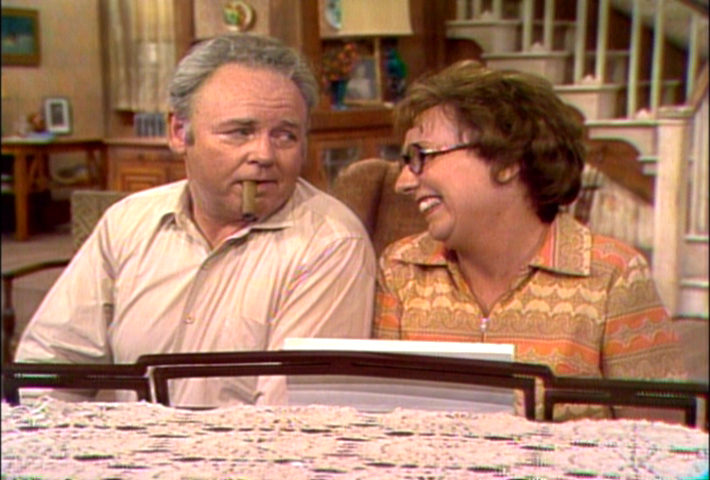Norman, Is That You?
In the 70s there were two main streams of sitcoms which inform comedy to this day. One was the Mary Tyler Moore Show line, which led to shows such as Bob Newhart, Taxi, Cheers and even The Simpsons. The other was the Norman Lear line, started with All In The Family and followed by Sanford And Son, The Jeffersons, Maude and Good Times. (I guess a third line began a few years later with Garry Marshall shows such as Happy Days, Laverne & Shirley and Mork And Mindy.)
The Mary Tyler Moore shows tended to be quieter, wittier and, I'd say, smarter. Lear's shows featured more emotion, more politics and more screaming. While I prefer the Moore line, there's something to be said for Lear's shows--especially All In The Family--which, even if they haven't always dated well, offered big laughs and memorable moments.
So I was interested in Norman Lear's autobiography, Even This I Get To Experience. Of course, it took a long time to get to All In The Family--about half the book. There are a hundred pages of his early days before show biz, then another hundred to cover his first twenty years as a rising writer-producer-director in show biz before we get to the stuff that people are waiting for.
Lear was born in 1922 to a Jewish family in Connecticut. He has plenty of colorful stories about his family, but the most memorable character was his father, Herman, whom Archie Bunker was based on. Herman would argue with his wife (telling her to "stifle") and tell Norman he was the laziest white man he'd ever met. He was a rogue, but more than that, he was a crook--he spent years in prison while his son was growing up. Once out he tried get-rich-quick schemes and even had his son work for him for a while before the business evaporated. That actually happened after Lear flew on bombing missions in WWII, and just before he came out to California with his first wife to make it.
But not necessarily in show biz. Then he and a relative through marriage, Ed Simmons, wrote a song parody that sold for forty bucks--at a time when their regular jobs only earned them fifty bucks a week. They realized they should write together, and soon sold a routine to Danny Thomas for a thousand bucks. (It helped that Lear was a good salesman who wouldn't take no for an answer.) This was clearly the business to be in.
It was the early days of TV and next they started writing (back in New York) for Jack Haley. This led to a job on the Colgate Comedy Hour featuring Martin and Lewis, and they were as big as writers could get in the new medium. Lear (who'd split up with Simmons and eventually teamed up with producer Bud Yorkin) went on to write for Martha Raye, Tennessee Ernie Ford and George Gobel, among others.
Then in the 60s he and Yorkin also got involved in movies, working in various capacities on such memorable titles as Neil Simon's Come Blow Your Horn (though they gave up the rights to his next two Broadway hits Barefoot In The Park and The Odd Couple), Divorce American Style, The Night They Raided Minsky's and Cold Turkey. Lear had a career in movies, and could have continued writing, producing and directing them.
But there was a show that he'd written, and shot three pilots for, and when it had a chance to get on, he was happy to go back to TV. It was called--after a couple changes--All In The Family, and after going up against all sorts of network censorship, and coming a bit slow out of the gate, it become the gigantic hit which put Lear on top. Lear talks about the windy path to success, as well as the fights with Carroll O'Connor, who was wonderful in the lead but hard to work with. Lear doesn't pull punches with stars who gave him trouble. He thought John Amos and Esther Rolle did a great job as the parents in Good Times, but never quite appreciated their position, and fought too hard against him--and against show breakout Jimmy Walker. They may have had decent motives, such as the image of African-Americans, but they didn't have the big picture in mind.
Lear created another innovative show in the 70s, the soap opera parody Mary Hartman, Mary Hartman. His company syndicated it, and it showed in most cities five times a week at 11 pm. This also led to his parody talk show Fernwood Tonight.
But Lear had other interests. He'd always been a liberal and his politics started to express themselves more and more--not just in his shows, but in real life. In the 80s he formed the advocacy group People For The America Way. While all this means a lot to Lear personally, it meant to me a lot of pages in the final quarter of the book best skimmed over.
Meanwhile, he helped finance some films, particularly those of Rob Reiner (who'd been Mike on All In The Family, though Lear had known him since he was Carl Reiner's young son), such as This Is Spinal Tap, Stand By Me and The Princess Bride. On the other hand, he never again dominated TV as he had in the 70s--shows such as Sunday Dinner and The Powers That Be didn't last long.
But his place in TV history was secure. He's one of the top producers the medium has ever known, and comedy wouldn't have been the same without him. I can recommend the book, though the middle sections on his show biz life are the main reason to read it.






0 Comments:
Post a Comment
<< Home